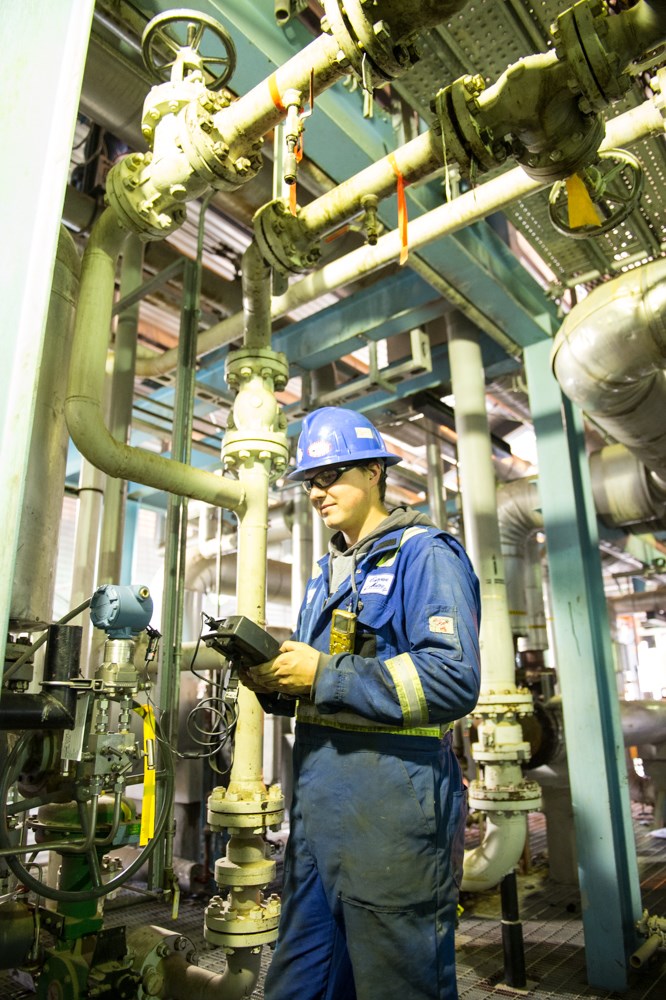rd in the meeting room at Estevan Meter had several names dispatched for work at a local gas plant the following week. Turnaround season was still in play, but soon coming to an end.
“We’re installing some CSA-compliant burner management systems,” said Doug Martens, president of Estevan Meter.
Five workers would be heading out for the big turnaround at the Plains Midstream Steelman gas plant. A total of 120 contractors took part in the turnaround in addition to Plains staff.
“A lot of oil companies coincide their battery shutdowns since they have to flare their gas anyway,” Martens said in relation to the gas plant shutdown.
This can be a busy time for Estevan Meter. He noted that many companies have trimmed turnarounds from their budgets this year.
“In terms of quantity, most of our turnaround business is driven by battery turnaround work, but it does include turnarounds at a number of gas plants,” Martens said.
A turnaround is when a facility is shut down and planned inspection and maintenance takes place. “In terms of batteries, typically they’re inspecting integrity of pressure vessels and tanks, looking for corrosion and the condition of the internal plastic coating.
“Some oil companies will shut down the entire battery site and do a fairly comprehensive inspection and maintenance program. But a lot of companies still want to keep production going, so they’ll shut down portions of the battery, so they don’t have to shut in oil production. They may shut down one vessel and divert to other vessels. If they have a treater and a free water knockout, they’ll try to put all the fluid to the free water knockout while they service the treater, and vice versa. They may fill their tanks up to try to minimize well downtime as much as they can. Some producers shut all the wells in, shut the battery down and do a full-blown turnaround.
“On the oil side, they’ll typically shut a portion down. On a gas plant, that has to be a full blown (shut down). It’s an assembly line, continuous stream, so you can’t shut down just a portion. With gas plant shutdowns, there’s various maintenance intervals or frequencies on certain equipment that has to occur. One of the things we provide is servicing of relief valves. Those don’t have to be serviced annually. Quite often it’s a three-year interval or longer. So even though the gas plant may shut down annually, it doesn’t have to be serviced that often,” Martens said.
Turnaround intervals are site and process specific. “A lot of companies are doing them every two or three years on treaters, on the batteries. Some sites get done annually, and some sites are beyond even three years,” he noted, then smiled and said, “And there are some guys who just don’t do any maintenance.
“There’s varying levels across companies. Some have evolved and have a better understanding of what they should do. Part of that lies in their business strategy, too. Companies that tend to own and hold and exist for a long period of time in the area, they seem to do a better level of maintenance than some companies that are here to extract, build up and sell. Different companies subscribe to varying degrees of the quality of the maintenance that they do.”
Different areas see different issues. For instance, near Wapella, sand buildup in a vessel is an issue. South of Weyburn, it’s sludge. In these areas, you can’t extend your service intervals too long before the vessel might have substantial sludge build up.
“Even a foot or two in the bottom can create problems and corrosion issues,” he said.
Pressure vessels and tanks are a big portion of turnaround. While those items themselves are not Estevan Meter’s business, the instrumentation, combustion and valve systems are.
“Our combustion business has played a key role in minimizing fire tube failures,” he noted. “We minimize fire tube effluent build-up, clogged or blocked fire tubes. We ensure even heat distribution and proper sizes. If you heat the metal too much, you’ll fatigue the metal.”
“We’ll select the burner equipment, the burner mixer and tip that will provide for proper size, adequate and even heat distribution.”
Most batteries and all gas plants require heat processes, he noted.
Estevan Meter’s direct work from turnarounds is about 10 to 20 per cent of their business, but it creates a lot of synergy around their entire business unit, he noted. “We supply a lot of the products needed for the turnarounds – gaskets, sacrificial anodes, bolting, cleaning materials.”
Overall, turnaround could contribute as much as 30 to 40 per cent of their business.
“We do the instrumentation. We are expanding into tank gauging, alarm testing and controls. We may do that at the time of the turnaround, and then do some combustion tuning a few days, a week later,” he said.



